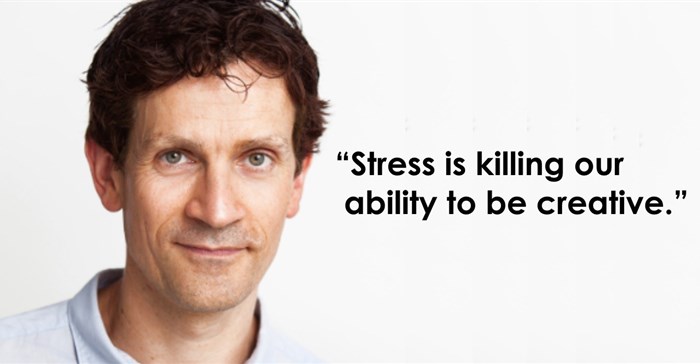
Just so I understand, is that everyone in the team who has permission to do this Monk Mode Morning or is that just sort of accepted thing?
It’s up to each person, it’s about finding what's best for you, finding the best rhythm for you. I think all of the evidence suggests that creativity follows chat. So the more an office talks to each other, the more the creative ideas flow from that. If you look at the way a creative idea is formed, it tends to be that I have an idea, on my own or with another person, and I come over and chat to you, I'll run it past you and you might shrug or wince, so that when I go over and present it to the next person, I’ve adapted it slightly. You tend to find creativity is iterative, it evolves when it’s tested in front of people. And so having a space for people to bounce those ideas off each other is really helpful, but it also needs the concentrated period.

And how do you balance that? I know you weren't referencing the 1800 mill owner as a positive thing, but how do you balance that desire for a level of control as a leader with the idea of flexibility of something like Monk Mode Mornings, or working from home, where you aren’t too sure where the team is at all times?
The critical thing really is trying to find a way to establish trust in a team. So say you’re the team leader. You probably need to know what you want your team to deliver for success, and albeit I don't love the Netflix culture document [Netflix Culture Deck], Netflix did something a few years ago which was all about really giving their team maximum autonomy and maximum responsibility. I think it was called responsibility of freedom, and the Netflix culture document says, ‘We’re not necessarily worried where you are at 4pm, but we are worried that you hit your numbers.
If you hit your numbers and you achieve what's expected of you, then you can do it in whichever way you want. And I think we’ve reached a stage, work has evolved to the level where now, it's standard that someone will expect you to answer an email at 7pm if it's a just a quick question about something. The quid pro quo for that has to be that maybe people aren't necessarily looking where you are when you've gone for a run at lunchtime or when you’ve maybe arrived a little late because you’ve attended to a personal responsibility. So I think it's about trying to get a balance between those things.
But you're exactly right, you know for any leader, for any boss, for anyone, they need to be thinking about, ‘How can I ensure that my team are doing the things that I'm expecting them to do?’ And for a lot of us, that means thinking far more about outputs than about inputs.
We used to be very preoccupied with the idea that work was a place as well as a verb and a noun – it was a place you went to do a job and increasingly, the place is less important but we need to have far more focus on what the expectation of someone is. So for a manager or anyone asking himself, success means what they will have accomplished in the next month or the next two months.

You touched on the work from home topic earlier on in our conversation and I know there's obviously been a lot of giving ‘work from home’ and taking it away like you did and at similar companies, so you were saying that there is evidence that it is not a good idea. Do you want to talk us through that?
Where ‘work from home’ can be productive is where it’s for short periods of time. There’s evidence for one day a week being fine. But what you suffer from when people work from home is they tend to connect with colleagues less and it just happens in almost every observable situation. So one example is that there's a brilliant guy called Ben Waber who now runs a company called Humanyze. He was at the Massachusetts Institute of Technology and studied software engineers and found that the effectiveness of software often depends on their syncing with each other. So they sometimes call that ‘the gap’, like ‘How can we reduce the gap between software engineers?’
He said that when you look at the evidence, software engineers who are co-located on each project they’re working on, tend to communicate about 40 times. When you have them not co-located, they tend to communicate about 8 times. So you've got this issue where generally, the quality of their work is largely based on the coordination between them. So more coordination means the work is better quality. He said, unfortunately if you're not co-located, the quality of the work is lower.
And you can measure that in call centre workers, in salespeople, in software engineers – when people don't communicate as much with each other, the quality of their work goes down. So, the evidence is that working from home does produce lower quality work. If someone works completely autonomously – maybe they're the only lawyer in a company – probably the impact will be marginally lower, the downgrade would be marginally lower, but also, I mentioned previously that one of the challenges of modern work is loneliness. In fact, one of the things that people who work from home report is the sense of being isolated, not knowing what their manager thinks of them, feeling lonely. So these things have a big impact on our experience of work.

Super interesting. One of the other ones you touched on earlier was the Netflix culture document. If anyone hasn't checked it out, it's just such a great thing to bounce your own thinking up against, because they are so deliberate and quite extreme on some statements. One of the statements I found really interesting and somewhat contrary to everything else I've heard, in a lot of companies, is they state that Netflix is like a professional sports team and if there are underperformers in the professional sports team, they get cut. How do you feel about those two different sides of the way of thinking about a sports team and a company?
I chatted with Patty McCord who helped write their Netflix culture document and she said that when they published the document, their job candidates halved overnight, so they were worried about that. Then they noticed that the candidates who were withdrawing were the candidates they didn't want.
One of the things you find in the Netflix culture document is exactly as you say, it’s a great thought experiment. They see if you achieve B-grade results – so good results, but not hot results – they'll pay you to leave the company. So it's like this very explicit ‘survival of the fittest’. They only want people who are achieving the very best results and at the expense that they’ll get rid of you if you're not delivering. So culture in their environment is highly accountable and it's not for everyone. They say if there's a choice, the choice is not that you've got job security but rather that you've got high-level accountability, so it's not for everyone.
But as you say, it's a very good thought experiment because you sit there and you say, ‘OK, I wouldn't want to work in that environment’, so it was self-selecting. Some people were very willing to work in this sort of hyper-capitalist, very accountable environment, other people wanted the security that if they had a bad quarter, about six months, they wouldn't be shown the door. But it's just an interesting one as so often, work cultures attempt to be all things to all people. They attempt to be focused on great perks, good benefits, that this is a lovely, likeable place to work. It's interesting and stimulating to see it because it's a culture where they’re very focused not necessarily on pleasing but on being different. 
This is kind of a broad question I suppose, but having spoken to all these people, which I find fascinating, and once again if you haven't checked it out, the Basecamp founder I found had a really interesting way of thinking, I thought Honest Smoothies had a really interesting view on things, and then Patty McCord as well. Also, having come from companies like Google and Twitter, which are well renowned for having strong work cultures, what would you say is the number one nugget you’ve picked up? Is there something which stands out in your mind as something which was surprising and super strong in itself?
Probably the importance of taking breaks. I was very much guilty of going home, working through lunch… certainly, when I go into chats to people in France or Spain they feel astonished by that. They'd don't work through lunch, but I was guilty of working through lunch and then going home and doing three hours of emails at home and felt like by adopting the approach of staying on top of things, I was being my best self.
What I found is that actually, one of the most important things we can do is to structure our relaxation time as importantly as our work time, because better ideas come to us and we’re most relaxed. We’ve all got first-hand experience – ‘I went for a walk and I had a really nice idea’, or when I was sitting listening to music, I had an idea about this. And all of us anecdotally have encountered the way that we've stumbled into ideas when we're on down time and then we fill our day with dashing around, trying to keep as busy as possible.
The thing that really struck me is quoted as the mantra of the British cycling team but I think it's actually a quotation from Winston Churchill, and the quotation Chris Hoy, he’s a British cyclist, said: ‘If you can't lie down, sit down,’ and the idea that at any point, you should be resting your legs, is a mantra of the British cycling team. So if you can't lie down, sit down. But lying down is better than sitting down. And that's the really interesting thing because it goes so antithetical to the way that we treat modern office work.
We tend to treat modern office work like the people who are going to win and prevail are the people who are doing 12-hour days and have worked out a way to work at weekends and they’re working more. One of the early people at Google went on to be their CEO Marissa Mayer, she said the secret of Google’s success was working 130-hours a week.
The danger of an idea like that is it then becomes a playbook that other people try to copy. And it may well be that that was one of the ways that they helped turn a brilliant idea into a successful business, but if anyone is trying to replicate it, it won't be a causal route to success. Working 16-hours a day, 7 days a week, there's no evidence that that will lead to people's best ideas and best creativity. So the thing that I've really been delighted to learn is the importance of breaks and treating our rest as importantly as we treat our work.
 OK, just so I understand, we’ve got the lunch break and your idea would be to at the very least get away from your desk, hopefully, get out of the office for lunch or something like that, so you feel like you've had a proper break. Just from a practical point of view, what other opportunities would you say – halfway through your afternoon, same in the morning as well? What would it look like?
OK, just so I understand, we’ve got the lunch break and your idea would be to at the very least get away from your desk, hopefully, get out of the office for lunch or something like that, so you feel like you've had a proper break. Just from a practical point of view, what other opportunities would you say – halfway through your afternoon, same in the morning as well? What would it look like?
The most creative thing that anyone can do is to go for a walk, walking alone or walking with other people is proven to stimulate creativity and our ability to come up with ideas. So even if it's not taking a break, getting away from your desk and varying your location can be can be really stimulating. So just giving your regards to different things in and not just trying to sit at a desk and get as much work done as possible. Variety is pretty important.
 That's awesome. I remember when I was working at Google X in San Francisco, there was pretty much an unwritten rule that if you wanted to have a one-on-one meeting, which didn't have a presentation, it had to be a walking meeting and obviously in the San Francisco Bay area, I remember walking out there and I must have seen 150 walking meetings all happening at the same time, everyone walking around, I guess it’s the same sort of thing.
That's awesome. I remember when I was working at Google X in San Francisco, there was pretty much an unwritten rule that if you wanted to have a one-on-one meeting, which didn't have a presentation, it had to be a walking meeting and obviously in the San Francisco Bay area, I remember walking out there and I must have seen 150 walking meetings all happening at the same time, everyone walking around, I guess it’s the same sort of thing.
Keep an eye out for Part 3 of this article that will be published under Jon Ratcliffe's profile next week. Follow Daisley on Twitter for more and click here to listen in to the Eat Sleep Work Repeat podcast.



























 You spoke about laughter and I remember my teacher at school saying that when you get a test paper, the first time you look at it you’ve got to have a little chuckle to yourself, as that just releases all the right things, so that you look at it in a different frame of mind. I remember trying it once or twice and I’m not too sure if it worked but I thought it was a really interesting idea.
You spoke about laughter and I remember my teacher at school saying that when you get a test paper, the first time you look at it you’ve got to have a little chuckle to yourself, as that just releases all the right things, so that you look at it in a different frame of mind. I remember trying it once or twice and I’m not too sure if it worked but I thought it was a really interesting idea. 




